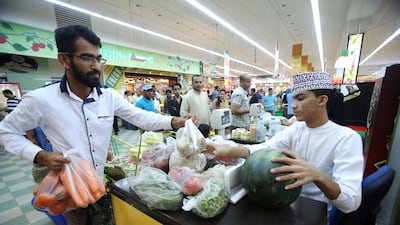MUSCAT // Food prices in Oman rise every year at the start of Ramadan, but this year shoppers have been hit particularly hard as retailers raised the price of most items by as much as 20 per cent – more than the usual 5 to 10 per cent.
Most shops defied a warning from the government last week to not increase food prices. Shoppers will now have to dig deep to stock up on groceries for the holy month.
“These greedy retailers are taking advantage of the holy month knowing that people cannot cut down on their food shopping,” said Ali Al Kaabi, a retired food inspector who used to work for the Muscat municipality. “I see prices have gone up to 20 per cent from the normal rate in almost everything edible. It is shameful.”
Oman’s Al Nakheel supermarket chain is now selling a kilogram of fresh kingfish for 4.95 rials (Dh47.23), up from 4.100 rials a week ago, while a 20kg bag of Indian basmati rice that was being sold at 13.500 rials is now priced at 16.350.
The price hikes mostly hit low-income Omanis and residents.
"We are already struggling with life and now these retailers have increased their prices for food," Qais Al Sinawi, a 27-year old man earning the minimum wage of 325 rials (Dh3,102) a month, told The National.
“We have high utility bills to pay when one considers it is already hot, and the food increase does not help our situation at all.”
According to government statistics from 2016, about 15 per cent of the 223,000 Omanis working in the private sector earn the minimum wage.
A manager of one of the biggest supermarket chains in the country blamed price hikes on increased charges from suppliers as a result of delivery costs going up ahead of, and during, Ramadan.
“For example, our fruit and vegetable suppliers say they pay more for delivery to our supermarkets. Same thing goes for fish, meat, flour and rice. So we are forced to raise the price because of the distribution cost that is passed to us retailers,” said the manager of the Muscat-based chain.
Food distribution companies acknowledge charging clients more during the Ramadan period because they have to pay staff overtime if they work longer than Ramadan hours – two hours less than the usual working day.
Usually they raise charges by around 5 per cent but this year have raised them by 10 per cent. It comes after the government removed energy subsidies in January last year.
But, the distribution companies say, retailers are still increasing food prices more than they need to.
“Retailers take advantage of the situation by doubling it,” said Hamood Al Ghatry, a supervisor for Ghadeer Distributions.
Mr Al Kaabi agreed that large retailers use distribution costs as an excuse to raise food prices unnecessarily high. He also questioned why there should be increases in the prices of non-perishable food items.
“In my experience as a food inspector, I know that big chains of supermarkets have large stocks to last at least three months,” he said. “They use higher transportation fees during Ramadan to exploit shoppers. They don’t stock up on a monthly basis but on a quarterly basis.”
foreign.desk@thenational.ae

